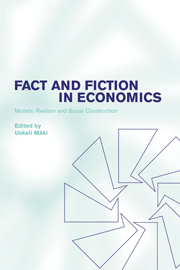Book contents
- Frontmatter
- Contents
- Notes on the contributors
- Preface
- I Introduction
- II Setting the scene
- III Economic models and economic reality
- IV The constitution of economic reality
- 11 Rational choice, functional selection, and “empty black boxes”
- 12 The reality of common cultures
- 13 Collective acceptance and collective attitudes: on the social construction of social reality
- 14 Hayek and cultural evolution
- 15 Putting evidence in its place: John Mill's early struggles with “facts in the concrete”
- V The institutions of economics
- Index
- References
11 - Rational choice, functional selection, and “empty black boxes”
Published online by Cambridge University Press: 22 September 2009
- Frontmatter
- Contents
- Notes on the contributors
- Preface
- I Introduction
- II Setting the scene
- III Economic models and economic reality
- IV The constitution of economic reality
- 11 Rational choice, functional selection, and “empty black boxes”
- 12 The reality of common cultures
- 13 Collective acceptance and collective attitudes: on the social construction of social reality
- 14 Hayek and cultural evolution
- 15 Putting evidence in its place: John Mill's early struggles with “facts in the concrete”
- V The institutions of economics
- Index
- References
Summary
Those of us who have welcomed rational-choice theory as a way of doing social science have often sourced that enthusiasm in a critique of the functionalist theory that it supplanted (Elster 1979). But this dual attitude of enthusiasm and critique has proved hard, at least in my own case, to sustain. For it turns out that in order to vindicate rational-choice theory as a mode of explaining social patterns in general – social patterns beyond the narrow range of economic behavior – we have to recognize the legitimacy of explaining what I have described as the resilience of certain patterns of behavior (Pettit 1993, 1995). And once we allow the legitimacy of explaining resilience, then we can see how functionalist theory may also serve us well in social science; we lose the basis on which the rational-choice critique of the theory has mostly been grounded (Pettit 1996).
Putting the matter otherwise, there is a common problem that rational-choice theory and functionalist theory each have to confront. I call this the problem of the “empty black box.” So far as I can see, both approaches are going to fail in face of this problem or they are both going to find resources for overcoming it; they are going to sink or swim together. Drawing on earlier work, I shall argue here that the problem can be overcome in the case of rational-choice theory but that the solution offered directs us to a parallel solution in the case of functionalist theory.
- Type
- Chapter
- Information
- Fact and Fiction in EconomicsModels, Realism and Social Construction, pp. 231 - 256Publisher: Cambridge University PressPrint publication year: 2002
References
- 2
- Cited by



